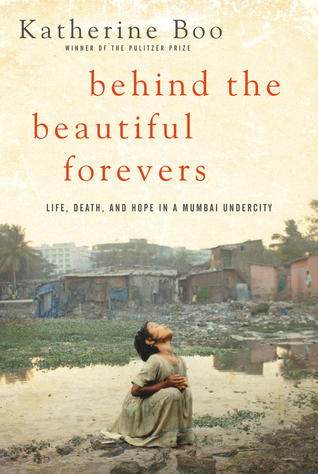Behind the Beautiful Forevers is a remarkable piece of non fiction prose. Written by Pulitzer Prize-winning reporter, Katherine Boo, the book follows the lives of various people who live in Annawadi, a small slum next to Mumbai's international airport. Annawadi is surrounded by glittering hotels and a concrete wall plastered with ads for tiles that promise to keep your house "beautiful forever." Behind those ads reside the disenfranchised citizens of 21st century Mumbai.
 The book presents many vivid characters but it centers on Abdul Husain, a teenage scavenger who spends his day looking for and sorting through trash so that he can make a profit on recyclable waste. He is reasonably successful in this venture and is his family's main source of income since his father is too sickly from TB and his mother has her hands full with her nine children. However, when his mother decides that their growing prosperity merits some renovations to their shack, she unwittingly angers Fatima, their one-legged next-door neighbor, whose actions set off a chain of events that lead Abdul and his family through the bowels of the nonsensical Indian judicial system.
The book presents many vivid characters but it centers on Abdul Husain, a teenage scavenger who spends his day looking for and sorting through trash so that he can make a profit on recyclable waste. He is reasonably successful in this venture and is his family's main source of income since his father is too sickly from TB and his mother has her hands full with her nine children. However, when his mother decides that their growing prosperity merits some renovations to their shack, she unwittingly angers Fatima, their one-legged next-door neighbor, whose actions set off a chain of events that lead Abdul and his family through the bowels of the nonsensical Indian judicial system.
Annawadi's other residents include Asha, a middle-aged woman who has made influential friends through dubious methods and is trying to attain her dream of becoming a slumlord. Her daughter, Manju, is poised to become Annawadi's first female college graduate and she runs a small "bridge school" for the children of the slum, funded by government money that her mother obtained through one of her many illegal ventures. Manju doesn't approve of all this corruption and tries her best to run her life on ethical lines, but there's only so much you can do and still survive in Annawadi. Her best friend Meena is less fortunate: she doesn't go to school, suffers repeated beatings from family members, isn't allowed to leave the house except to collect water or go to the toilet, and has her marriage arranged at age 15. By comparison, Manju is practically a princess. There is also Sunil, a 12-year old scavenger and occasional thief who returned to Annawadi with his younger sister after a stint at the orphanage run by Sister Paulette who gives the orphans ice cream when foreigners arrive for a site visit, but otherwise sells their food and blankets for a profit and pockets all the charitable money she can get.
Boo only enters the narrative in a final Author's Note at the end of the book. Here she explains how she spent time in Annawadi from 2007 to 2011, wearying the residents with multiple interviews, teaching children how to use her Flip Video camera so that they could document many of the events related in the book, and culling over 3000 government records from the Mumbai Police, public health agencies, hospitals, electoral offices and more, to illustrate in detail how these entities systematically alter details, falsify documents, and treat the poor as ignominiously in death as they do in life.
Behind the Beautiful Forevers presents the age-old story of Indian corruption, but instead of random facts and figures, Boo gives us the names and stories of actual people who are offered basic human rights only if they can pay for them. Boo doesn't pretend that these people are flawless human beings - they all harbor varying amounts of vices and virtues, just like the rest of us. But they are victims of a corrupt and demoralizing system that has left them with increasingly impossible dreams of a better life.
 The book presents many vivid characters but it centers on Abdul Husain, a teenage scavenger who spends his day looking for and sorting through trash so that he can make a profit on recyclable waste. He is reasonably successful in this venture and is his family's main source of income since his father is too sickly from TB and his mother has her hands full with her nine children. However, when his mother decides that their growing prosperity merits some renovations to their shack, she unwittingly angers Fatima, their one-legged next-door neighbor, whose actions set off a chain of events that lead Abdul and his family through the bowels of the nonsensical Indian judicial system.
The book presents many vivid characters but it centers on Abdul Husain, a teenage scavenger who spends his day looking for and sorting through trash so that he can make a profit on recyclable waste. He is reasonably successful in this venture and is his family's main source of income since his father is too sickly from TB and his mother has her hands full with her nine children. However, when his mother decides that their growing prosperity merits some renovations to their shack, she unwittingly angers Fatima, their one-legged next-door neighbor, whose actions set off a chain of events that lead Abdul and his family through the bowels of the nonsensical Indian judicial system.Annawadi's other residents include Asha, a middle-aged woman who has made influential friends through dubious methods and is trying to attain her dream of becoming a slumlord. Her daughter, Manju, is poised to become Annawadi's first female college graduate and she runs a small "bridge school" for the children of the slum, funded by government money that her mother obtained through one of her many illegal ventures. Manju doesn't approve of all this corruption and tries her best to run her life on ethical lines, but there's only so much you can do and still survive in Annawadi. Her best friend Meena is less fortunate: she doesn't go to school, suffers repeated beatings from family members, isn't allowed to leave the house except to collect water or go to the toilet, and has her marriage arranged at age 15. By comparison, Manju is practically a princess. There is also Sunil, a 12-year old scavenger and occasional thief who returned to Annawadi with his younger sister after a stint at the orphanage run by Sister Paulette who gives the orphans ice cream when foreigners arrive for a site visit, but otherwise sells their food and blankets for a profit and pockets all the charitable money she can get.
Boo only enters the narrative in a final Author's Note at the end of the book. Here she explains how she spent time in Annawadi from 2007 to 2011, wearying the residents with multiple interviews, teaching children how to use her Flip Video camera so that they could document many of the events related in the book, and culling over 3000 government records from the Mumbai Police, public health agencies, hospitals, electoral offices and more, to illustrate in detail how these entities systematically alter details, falsify documents, and treat the poor as ignominiously in death as they do in life.
Behind the Beautiful Forevers presents the age-old story of Indian corruption, but instead of random facts and figures, Boo gives us the names and stories of actual people who are offered basic human rights only if they can pay for them. Boo doesn't pretend that these people are flawless human beings - they all harbor varying amounts of vices and virtues, just like the rest of us. But they are victims of a corrupt and demoralizing system that has left them with increasingly impossible dreams of a better life.









.jpg)













